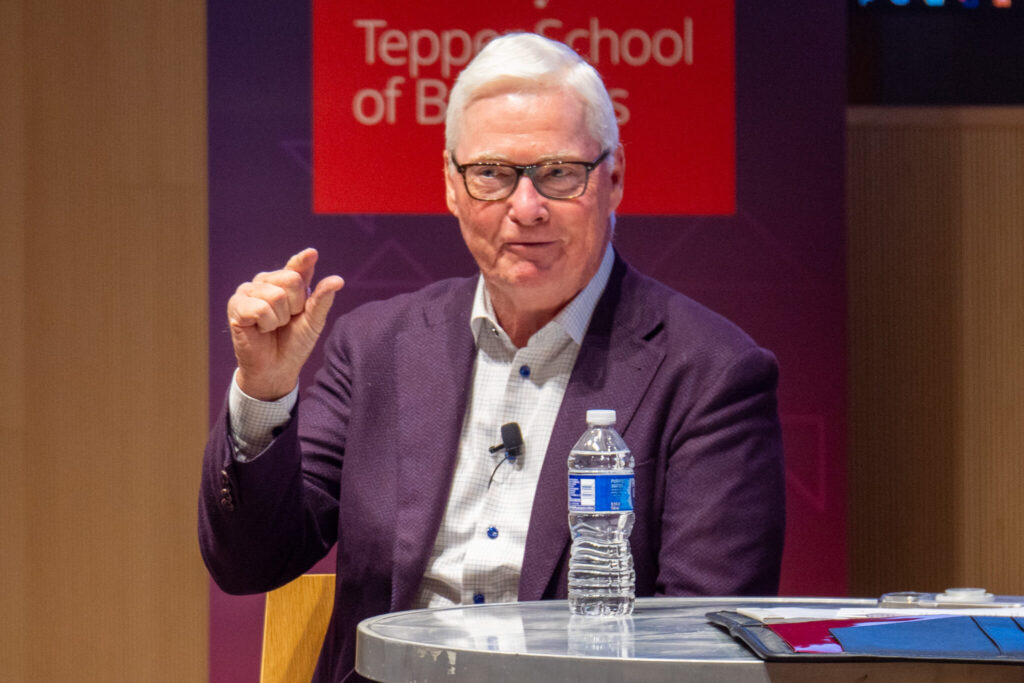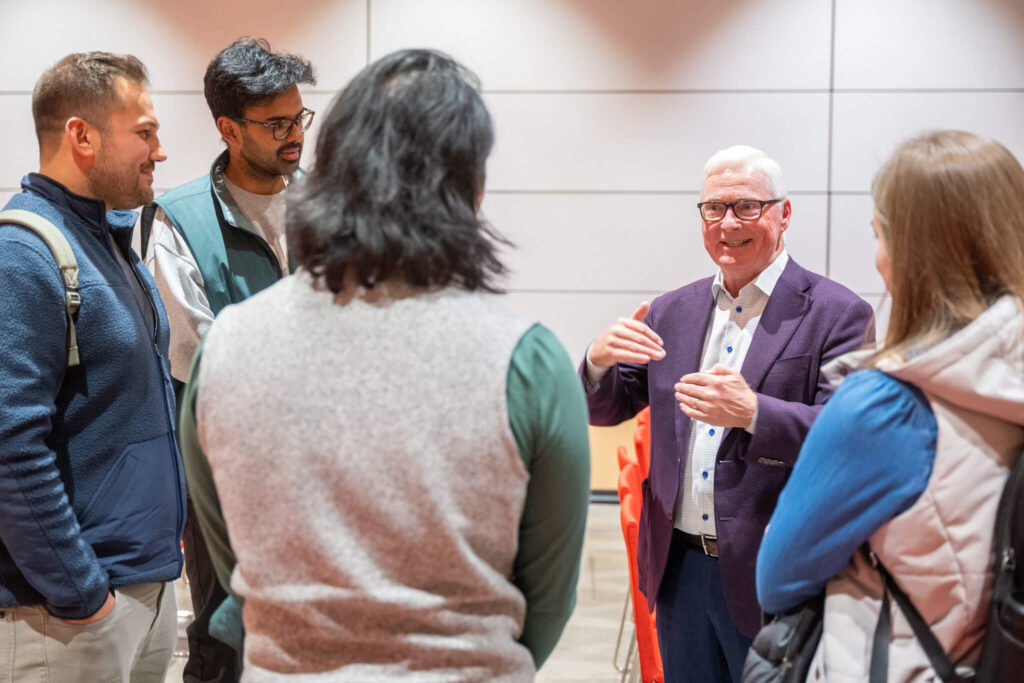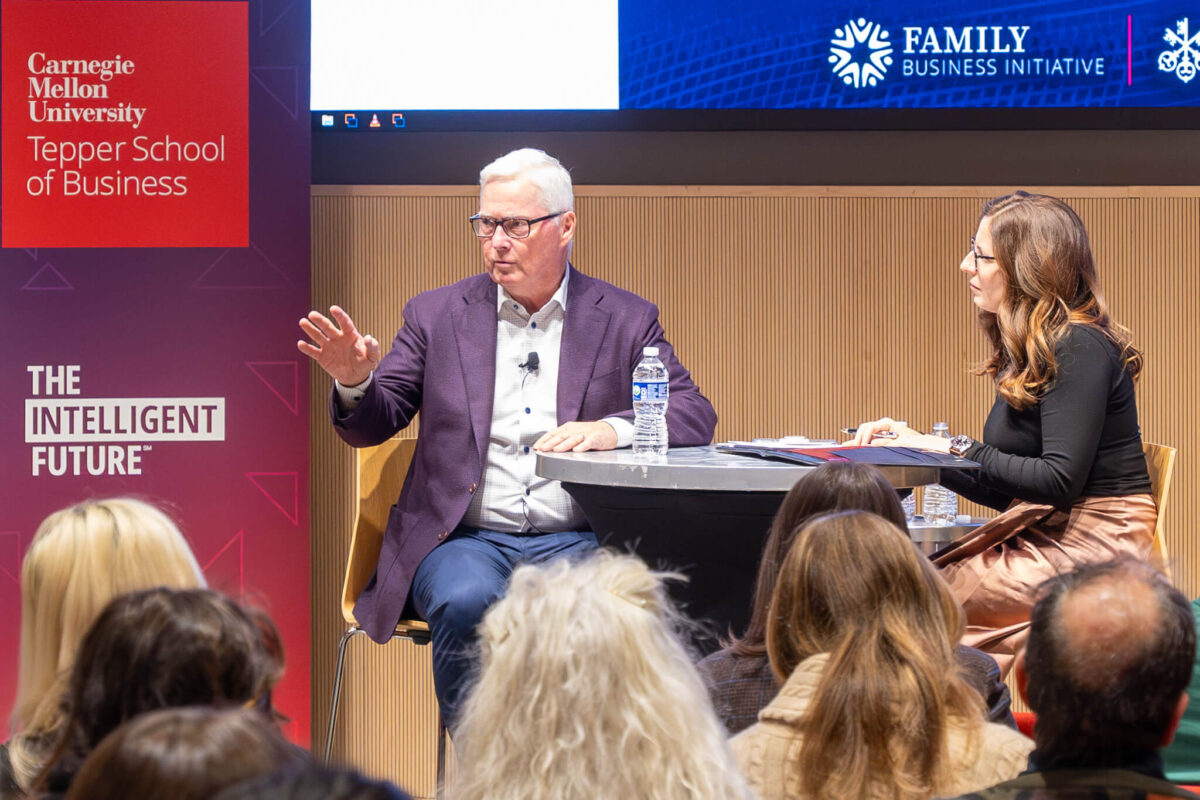“Get into street fights.” Ed Stack, the Executive Chairman of Dick’s Sporting Goods, told me. The man became a billionaire by collecting and selling an arsenal of sports gear. Business is his competitive sport. He goes on to advise me, “And when it gets bad, make sure you have friends to back you up.”
Ed isn’t in his twilight years just yet. Though he has changed the retail landscape, he is concerned with what’s next. Specifically, “What is going to come along that will kill Dick’s Sporting Goods?” That thing may not exist today, but it will tomorrow. That’s why he’s hoping to invent it. Innovation requires youth and talent.
To solve part of the equation, Ed came to Carnegie Mellon University to recruit young talent. Last night he spoke at The Family Business Leadership Speakers Series hosted by Meredith Meyer Grelli. Both Stack and Grelli are family-focused entrepreneurs with a series of multigenerational wins. The series, given the nature of families, examines ethical choices and values beyond quarterly profits.
Disclosure: As a Founder-in-Residence at the Swartz Center for Entrepreneurship, I have access to CMU’s schedule of events.
In the opening topic, Stack discusses his first move. He worked at his father’s store starting as young as 13. He hated it at first but fell in love with the business over time. Ten years later, Stack wanted to grow the business. Later at 23, Ed and his father had a ‘spirited’ conversation. He recalls an ultimatum his father laid down: “If you think you’re such a smart son of a bitch, go down to the bank, get a line of credit, and buy me out.”

“So that’s what I did.” Ed went to the bank, got the credit, and came back to buy out the business. His father wasn’t ready for the transition quite yet. It took a couple of years, but Ed Stack acquired the two small stores in 1984. He started scaling Dick’s Sporting Goods immediately afterward.
Heading back to the street fight, Stack said to make friends. In context, he recommends developing relationships. Relationships turn into partnerships. Trust is earned by follow-through. Companies like Adidas wouldn’t look at Dick’s Sporting Goods originally, but now it’s one of their largest accounts.
Stack says it’s those partnerships that saved Dick’s Sporting Goods through the 1987 Savings and Loan Crisis. Dick’s banking partners had suffered a near collapse and it put pressure on the retailer. Stack asked Nike if Dick’s could delay their payment. They agreed, giving Dick’s time to find a new bank. The following January, they paid the account in full. Stack explained that if it hadn’t happened that way, life would have been difficult.
Stack emphasizes that his competitive nature is external. There’s no room for fighting each other in his locker room. Even his speech is filled with “we” as he tells the history of the retailer. He talks about the importance of bonding experiences and getting people on the same page. He disdains pleasantries that prevent smart people from addressing elephants in the room. He advises developing a team that can have spirited conversations to push the group forward.
A good portion of his lecture at Grelli’s series on family leadership was devoted to Stack’s choice to remove certain guns from Dick’s Sporting Goods shelves after the Parkland High School Shooting. Four years later, talking about the Parkland Shooting still moves Stack to the verge of tears.
Stack stated that being a family business allowed him the leeway to make the radical, and he would argue, the right move. He estimates the decision cost the retailer $250 million in revenue. However, Dick’s has found in some cases that replacing that shelf space actually made them more money in the long run. To do nothing in the wake of such violence would have been a sin in Stack’s mind.
Since this was part of the Family Business Leadership Speakers Series, Grelli shifted the focus back towards running a family business. As they entered the Q&A section, students asked about dealing with heirs and kin. What happens when your family is a walking fortune? Do they instantly get an annuity? Stack had an answer for that…
“There’s a trust… The vault is closed,” Stack said. “They can’t be ski bums sitting around doing nothing.”
Dick’s Sporting Goods family members are expected to get a good education and go out into the world. Part of the family agreement is that they have to work at other places before joining the company. Secondly, Stack explained, “Everyone needs to be participating in society.” Making money isn’t the end goal. Each member is expected to champion causes, assist nonprofits, or help the community in their own way.
Grelli points out that without proper context, Stack may seem like an aggressor. He’s not. He has character. And he hopes to develop characters. The next generation of characters is in the 250 students that filled Simmons Auditorium to hear his stories.
Stack stayed after his lecture and spoke to everyone who lined up to meet him.

Ed Stack stands tall among Pittsburgh’s leaders. While many do not think of business as a sport, Ed does. There will be wins and losses. Players will come and go. A good coach leads their players to a better life, and he views himself as such a coach. He’s not only recruiting for tomorrow but also pitching a theory on how Pittsburgh business owners can run community-oriented enterprises.
At the end, I thanked Stack for coming out. His parting advice was, “Don’t be afraid of spirited conversations.” He wanted to remind me, and you, dear reader, that we’re in this together. Pittsburgh is a team. Disagreements arise in friendships, but we should view them as opportunities to rethink problems, and if we’re good, design a better tomorrow.
Ed Stack’s book It’s How We Play the Game: Build a Business. Take a Stand. Make a Difference. is available on Amazon.
The UBS Family Business Leadership Speakers Series continues with Meredith Meyer Grelli at Carnegie Mellon University on:
- February 7, 2024 – George Tong, Geminin Food Corporation
- March 13, 2024 – Helen Hanna Casey, CEO of Hanna Holdings

